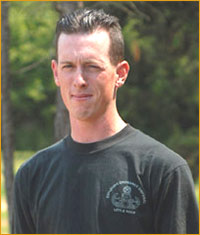2007 Airman of the Year
winner

Staff Sergeant Matthew Patnaude
Born in Palmyra, New York. Enlisted shortly before the Sept. 11, 2001 terrorist attacks. Mentors Boy Scouts in Arkansas.
LITTLE ROCK AIR FORCE BASE, Ark. - It's sticky hot in the Arkansas wilderness. Staff Sgt. Matthew Patnaude is crouched in a man-made clearing, a wide circle of sun-bleached gravel. His fingers work blasting caps, detonation cord and a fat brick of C4 plastic explosives that, if ignited, would blow him to vapors.
Instead, the training exercise ends minutes later with a controlled detonation. It's stunning for the uninitiated. The blast spits rock high above the tree line and yields a lingering cloud of black smoke.
This is pedestrian to Patnaude. At 24, he wears twin Purple Heart medals. Both were earned in the course of his dirty and dangerous job: disarming roadside bombs, the No. 1 killer of American troops in Iraq.
Patnaude's work with explosive ordnance disposal units has put his profile on the rise. His supervisors say he's meticulous but bold, exactly the demeanor needed to clear bombs day after day in the desert. And Patnaude isn't shy, they say, about revealing his scars and his wisdom to junior airmen who look to him for tips and guidance.
Snipers, explosive booby traps and sandstorms defined Patnaude's tours in Iraq. Stationed in Kirkuk, he completed a dizzying 105 missions in his last five-month deployment. In 2006, he neutralized 45 makeshift bombs, more than 40,000 pieces of explosive ordnance and nine insurgent weapons caches.
The bombs came in all flavors. Some were fitted with fuse wire strung to a nearby hideout. Others were rigged to remote devices, often cordless phones, or circuits draped across the road.
"Over there, anything could be a bomb," Patnaude said. "That little piece of trash, that mound of dirt, could be covering something explosive."
Some threats seemingly came from nowhere. In July 2005, as he and his team chief were responding to a call during his first Iraq tour, the team chief stepped on a bomb-rigged sewing machine pedal hidden under the powder-fine sand. Both airmen received a Purple Heart: the chief for nonfatal blast injuries, Patnaude for a ruptured eardrum.
More than a year passed before Patnaude earned his second. The December mission near Kirkuk began as most did. From the truck, Patnaude activated his one-armed sidekick, a Remotec robot controlled remotely with joysticks, dials and a squiggly view screen. The camera-fitted robots check out suspected bombs. Disarming them is still a hands-on job.
Patnaude crumbled shortly after stepping off his truck's back ramp as a sniper's 7.62mm bullet entered his left leg, nicking his intestines and tailbone on the way out.
His team radioed for airlift. Not until this sandstorm clears, the base radioed back.
The roughly 30 soldiers defending the team's position were startled when an Army Special Forces patrol sped into view and slid Patnaude, half-paralyzed on a stretcher, into the back of their Humvee. The SF soldiers treated him in the field, plugging his exit wound with a tampon, then sped to a nearby house in pursuit of the sniper. During the raid, which did not root out the gunman, Patnaude lay prone by the hatch gunner's legs.
Patnaude is now patched up, a colostomy bag and spinal surgeries behind him. While recovering, he helped convince commanders that snipers were singling out EOD airmen because of their distinct dress. Across Iraq, EOD team chiefs were immediately cleared to put their airmen in Army uniforms, says Master Sgt. Amanda Alexander, an EOD veteran stationed at Little Rock.
Back in Arkansas, Patnaude is a humble standout who leads Boy Scouts of America treks into the surrounding woods in his off time.
His supervisors tell him he can leave the military if he wants. But Patnaude, restless in Little Rock, still hears the desert calling his name.
"He just won't quit," Alexander says. "He's putting his life on the line, but for Matt, it's really about keeping everyone else safe. That's his reward."
